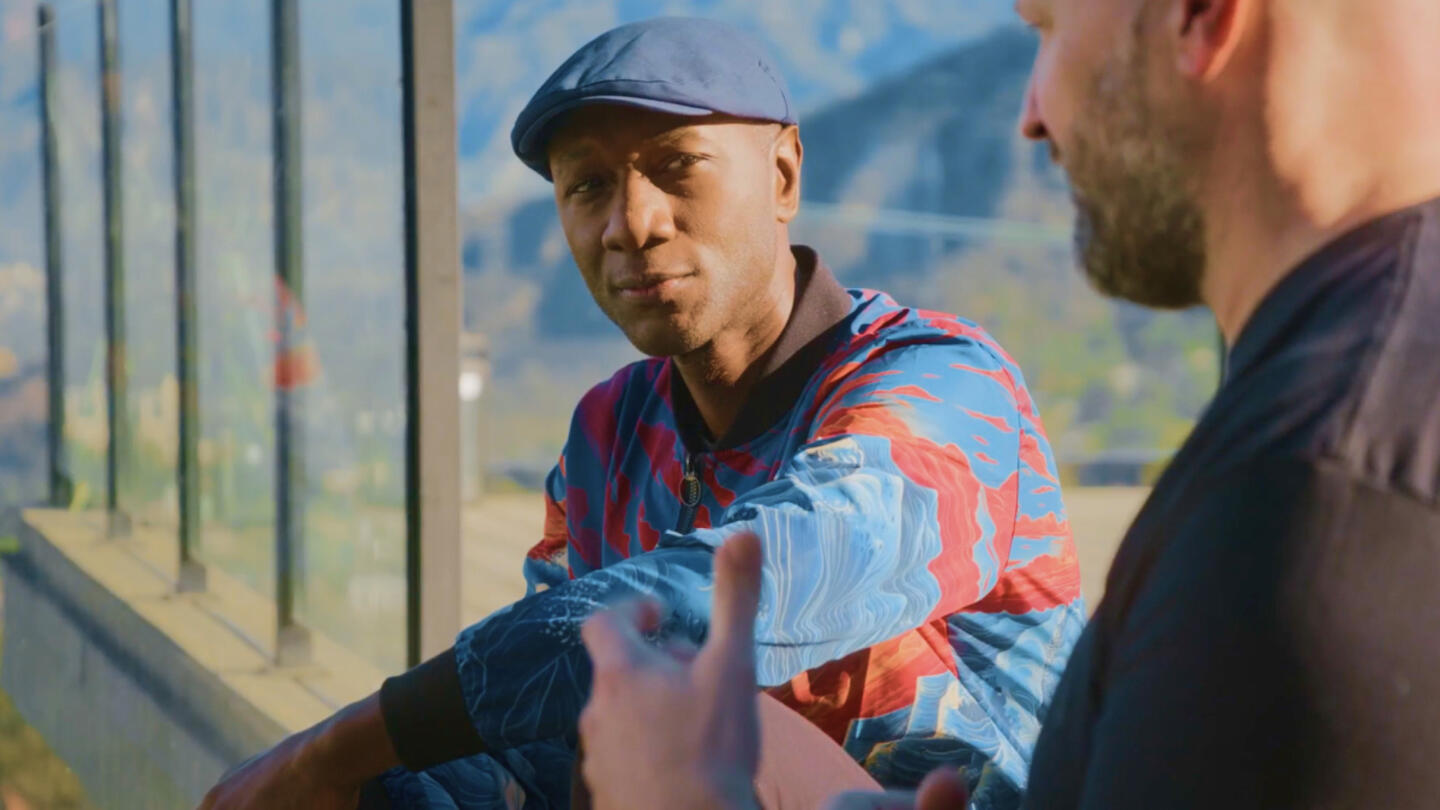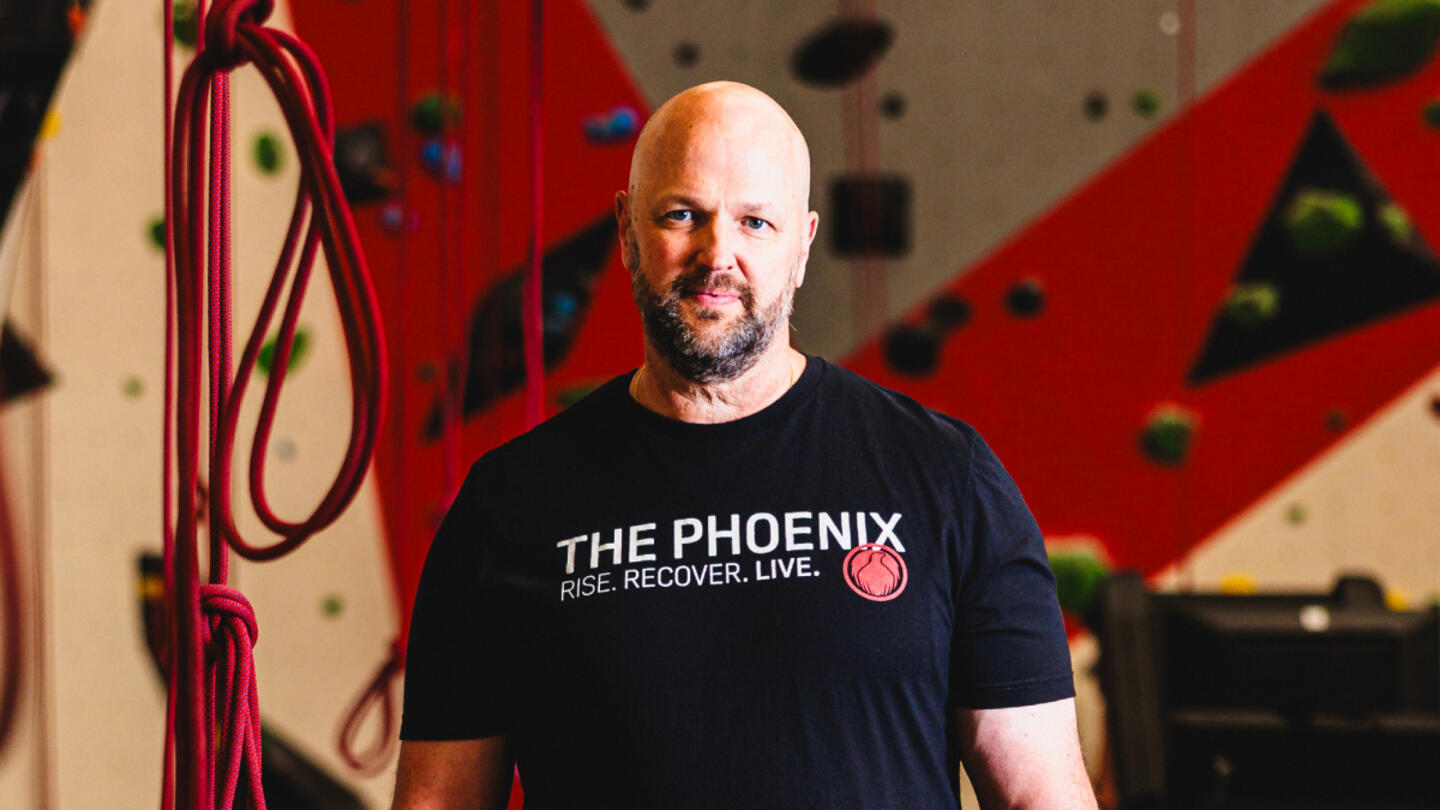Holed up in his apartment, hiding from a world he was afraid to live in, Scott Strode thought about dying.
He had been using cocaine for over 24 hours and, in that moment, was convinced he would die on his bathroom floor. “I was thinking that this was how my life was going to end, and somebody would have to tell my mom,” he recalled. “That broke my heart. That was the last night I drank or used.”
The next morning, all Strode could think about was, now what? He had been using drugs and alcohol since he was 11 and didn’t know who he was without them.
He needed to change how he viewed himself.
Strode pieced together a new identity in the boxing gym, climbing ice on a mountainside, and crossing the finish line of a triathlon. He became part of fitness communities that not only taught him to push his limits but also revealed his inherent strength and resilience, which gave him what he needed to transform his life.
As the co-founder and CEO of The Phoenix, a sober-active community, Strode has helped transform the lives of over 700,000 people seeking identities beyond the label of “addict.”
Now, he is sharing his story with the world. In his new book, “Rise. Recover. Thrive.,” Strode recounts his journey from addiction to recovery to helping hundreds of thousands of others like him.
As he says in the book, “Everybody has intrinsic strength and the ability to rise if they can find a nurturing space to do that.”
Strode recently joined Evan Feinberg, senior vice president at Stand Together and chairman of Stand Together Foundation, to discuss his story and The Phoenix’s remarkable success in transforming lives.
This conversation has been edited for length and clarity.
Mental health and addiction aren’t niche issues
Evan Feinberg:
In America, we have 48 million Americans experiencing addiction, with another 20 million in recovery. This isn’t a niche issue. We’re losing our loved ones to this disease, and top-down approaches aren’t working. Enter Scott Strode, CEO of The Phoenix, a sober-active community that has helped hundreds of thousands of people heal from addiction. His work with The Phoenix offers valuable insights into addressing addiction through community and personal engagement.
Welcome, Scott. Your book takes us through your own journey toward recovery. Let’s start at the beginning. Tell us about your childhood and how your addiction happened.
Scott Strode:
My addiction started long before I ever tried drinking or drugging. It started when I was a kid. Growing up with a father who had untreated mental illness and a stepfather who was an active alcoholic, I developed self-esteem wounds that shaped my view of myself and my potential.
My mom was on the other side of that spectrum. She was a workaholic. She had trouble being emotionally present, and it was easier for her to focus on the opportunity she was trying to give us than to sit and be present with us when we were kids. It was a different kind of wound.
My story may seem tame compared to others, but it’s important to recognize that pain exists on a continuum, and everyone’s struggle is valid.
Evan Feinberg:
Can you go a little deeper into your descent? What created a turning point?
Scott Strode:
Not only were alcohol and drugs in my family culture — my cousins gave me my first beer when I was 11 — but drugs made my pain go away for a little bit. Then it came back. I had to use a little more and a little more and a little more.
I was a pretty lonely kid and usually felt like I was on the sidelines, so I was always looking for connection. I actually found the connection I was seeking in that community of people using drugs and alcohol. All of a sudden, people wanted to be around me. I was the life of the party. I’d have people over, and I could steal booze from the liquor cabinet for them.
I was 15 at the time. It felt like people wanted to be around me. That was what kept fueling me down this path.
Sign up for the Strong & Safe Communities newsletter for stories, ideas, and advice from changemakers working with their neighbors to address the biggest problems we face.
‘Maybe I could be that guy’
Evan Feinberg:
Could you share a little more about your low point and why it wasn’t hitting “rock bottom” (a phrase you critique in the book)?
Scott Strode:
We need to let go of the idea that you have to hit rock bottom to change. For many, the bottom is death or homelessness, but any moment where you can see life differently is an opportunity.
The last night I used, I was locked up in my apartment, hiding out in the bathroom. I was thinking that this was how my life was going to end, and somebody would have to tell my mom. That broke my heart.
I woke up that next morning, and I thought, “Now, what? Who am I?” Even though that “addict” identity was negative, that’s all I knew about who I was, and I had to build a new one.
One day, I saw a brochure for climbing. There was a picture of someone climbing. They were looking up at this ice climb in front of them, and I started to dream that maybe I could be that guy. I found the courage to sign up for a class, and I stayed sober the night before to go do this thing. After linking a bunch of climbing trips together, I finally found my recovery.
As soon as I jumped into it, I wanted to share it with others. For me, it felt like getting out of a burning building. And I thought, “There are other people in there, I can’t walk away.”
Evan Feinberg:
Can you speak a little bit to how the principles that we talk about every day at Stand Together (mutual benefit, self-actualization, dignity) were so key to your journey?
Scott Strode:
The first example of that was the climbing guide. He loved that sport. He taught me about it. He went up the climb effortlessly, and I struggled my way up. I was sweating and falling off. Ice was hitting me in the face. I was not very graceful. (I’m not ever really accused of being graceful.) But I got to the top, and I thought maybe someday I could climb like him. He was self-actualizing by sharing his love and passion with me, helping me be lifted.
I started to realize that just crossing the finish line in the triathlon or getting to the top of a climb was empty if I didn’t share it with other people. So I started trying to bring other people with me.
Then seeing so many people in recovery, still white-knuckling it even at 15 years sober, I thought, “Man, you need to go climbing with me. Let’s get out and climb.” And that’s how casually Phoenix started. A group of friends started getting out with a few people and doing these activities.
A recovery community where addiction isn’t the main focus
Evan Feinberg:
There are billions of dollars spent addressing addiction and mental health crises in this country, and most of those approaches aren’t working. What makes The Phoenix unique? What is it disrupting?
Scott Strode:
We had this instinctual feeling that the way to address addiction wasn’t by finding a drug to get you off a drug or a 30-day treatment that you then leave and have to go back and figure out how to live your real life. We believed it was much more complex than just the substances. Maybe you’re self-medicating around mental health stuff, managing pain, or whatever it is — emotional pain.
We rarely talk about addiction at Phoenix. We know that’s what brought us through the door, but usually, we’re talking like, “Hey, that rock climb, did you go with your right hand there and then, what was your left foot doing? And how did you make that last move to the top?” It becomes a little moment where you’re starting to unlock this belief in yourself.
The negative messages I got as a kid started to be broken down by those climbing guides and triathlon coaches as they helped me do hard things.
At Phoenix, we help each other dream what’s possible in our lives and achieve it. That’s how our lives are transformed.
Scott Strode:
I was recently on “The Kelly Clarkson Show,” and one of the sound guys came up and fist-bumped me, like, “Hey, man, I got seven years.”
If we don’t put addiction out there, then it’s going to stay in that shame space, and that’s going to perpetuate it and keep it in the dark where it thrives.
By bringing it into the light, we also start to show folks that their idea of who an addict is, or somebody who’s experiencing homelessness or mental health struggles, isn’t what they thought. It looks like us. It looks like the people that have gone by this building since we started talking.
We’re all in recovery from something. We’re all rising from the ashes of something, and we all have the ability to help each other do it — if we come together.
In his “memoir with a mission,” Strode shares his extraordinary journey from addiction to founding The Phoenix, a national sober-active community that has empowered more than half a million people to thrive in sobriety.
“Rise. Recover. Thrive.” is a pathway to hope for millions of people — and their loved ones — who are struggling with addiction.
The Phoenix is supported by Stand Together Foundation, which empowers individuals to reach their full potential through community-driven change.
Learn more about Stand Together’s efforts to build strong and safe communities and explore ways you can partner with us.

At this ‘resort,’ children with intellectual disabilities are seen as gifts to be celebrated and loved.

Veterans experience loss when leaving service. Could this be key to understanding their mental health?

The Grammy-nominated artist is highlighting the stories we don’t get to hear every day.

With his latest project, Blacc isn’t just amplifying stories — he’s stepping into them
